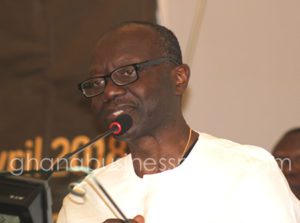Avoid expenditure commitments leading to judgment debts – Minister

Finance Minister Ken Ofori-Atta has reminded metropolitan, municipal and district assemblies (MMDAs) to ensure expeditious completion of ongoing projects to avoid expenditure commitments crystallising into judgment debts.
They must ensure arrears clearance, outstanding payments, non-accumulation of new arrears as well as speedy completion of projects as contained in the Public Financial Management (Public Investment Management) Regulations, 2020, (L.I. 2411).
The Finance Minister gave the advice in a speech read on his behalf at the 2024-2027 Composite Budget Hearings in Cape Coast for MMDAs in the Central Region on Monday.
The hearing, which symbolised the final stage of budget preparation process by MMDAs, began in all the 261 assemblis across the 16 regions simultaneously from Sunday, October 8, to Saturday, October 21.
It is being attended by metropolitan, municipal, and district chief executives (MMDCEs), coordinating directors, presiding members, heads of departments, traditional authorities, assembly members and budget officers.
It serves as a platform not only for quality assurance of the budget but also to validate the crucial linkage between the budget of the National Medium-Term Development Policy Framework and the District Medium-term Development Plan.
The goal is to ensure that all government programmes were meticulously captured within the approved expenditure ceiling.
Mr Ofori-Atta tasked the assemblies to intensify revenue mobilisation, particularly from Internally Generated Funds (IGF) and reduce their over-dependence on central government transfers.
He encouraged the MMDCEs to personally spearhead the crusade to improve revenue generation in their respective assemblies.
The assemblies and their chief executives must be guided by the Revenue Improvement Action Plan (RIAP) as a valuable tool that held the potential to significantly enhance their revenue mobilisation.
The MMDAs must also empower the sub-structures (Sub-Metros, Urban, Town, Area, and Zonal Councils) established by law, to execute delegated functions on their behalf.
“It is imperative to activate and reinforce these structures, ensuring they are fully operational to strengthen revenue mobilisation efforts and effectively carry out their delegated responsibilities,” he said.
“Therefore, I strongly encourage the Budget Committees to explore innovative strategies and corresponding activities that will aid us in attaining our shared objective.”
Mr Bless Darkeh, the Regional Budget Officer, said the exercise was key to the realisation of the national shared vision for a prosperous, inclusive, and sustainable community.
“The budget represented a choice, a decision on where and how we allocate our limited resources. As we scrutinise these allocations, let us keep in mind the core principles of transparency, accountability, and responsiveness.”
“Our constituents trust us to make decisions that benefit the greater good, and it is our responsibility to ensure that their trust is well-placed.”
Education, healthcare, infrastructure, and social services were not just budget programmes but pillars upon which the communities were built, Mr Darkeh said.
He, therefore, urged budget officers to carefully examine the proposed allocations in their areas and strike a balance to promote short-term stability and long-term growth.
For the first day of the exercise, the Cape Coast Metro, Komenda-Edina-Eguafo-Abrem, Ekumfi, and Mfantseman assemblies took turns to read their budgets for scrutiny.
Other MMDAs will follow in subsequent days.
Source: GNA
